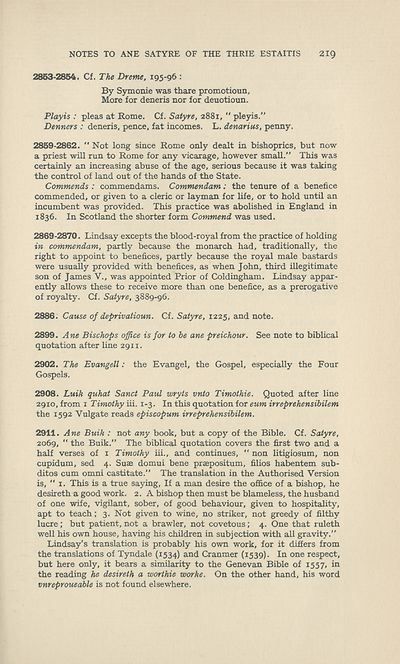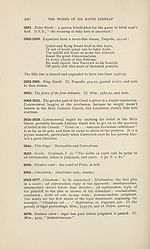Scottish Text Society publications > Third series > Works of Sir David Lindsay of the Mount, 1490-1555 > Volume 4, 1936
(287)
Download files
Complete book:
Individual page:
Thumbnail gallery: Grid view | List view

NOTES TO ANE SATYRE OF THE THRIE ESTAITIS 2l<)
2853-2854. Cf. The Dr erne, 195-96 :
By Symonie was thare promotioun,
More for deneris nor for deuotioun.
Playis : pleas at Rome. Cf. Satyre, 2881, " pleyis.”
Denners : deneris, pence, fat incomes. L. denarius, penny.
2859-2862. " Not long since Rome only dealt in bishoprics, but now
a priest will run to Rome for any vicarage, however small.” This was
certainly an increasing abuse of the age, serious because it was taking
the control of land out of the hands of the State.
Commends : commendams. Commendam: the tenure of a benefice
commended, or given to a cleric or layman for life, or to hold until an
incumbent was provided. This practice was abolished in England in
1836. In Scotland the shorter form Commend was used.
2869-2870. Lindsay excepts the blood-royal from the practice of holding
in commendam, partly because the monarch had, traditionally, the
right to appoint to benefices, partly because the royal male bastards
were usually provided with benefices, as when John, third illegitimate
son of James V., was appointed Prior of Coldingham. Lindsay appar¬
ently allows these to receive more than one benefice, as a prerogative
of royalty. Cf. Satyre, 3889-96.
2886. Cause of deprivatioun. Cf. Satyre, 1225, and note.
2899. A ne Bischops office is for to be ane preichour. See note to biblical
quotation after line 2911.
2902. The Evangell: the Evangel, the Gospel, especially the Four
Gospels.
2908. Luik quhat Sanct Paul wryts onto Timothie. Quoted after line
2910, from 1 Timothy iii. 1-3. In this quotation for eum irreprehensibilem
the 1592 Vulgate reads episcopum irreprehensibilem.
2911. Ane Buik : not any book, but a copy of the Bible. Cf. Satyre,
2069, " the Buik.” The biblical quotation covers the first two and a
half verses of 1 Timothy hi., and continues, “ non litigiosum, non
cupidum, sed 4. Suae domui bene praepositum, filios habentem sub-
ditos cum omni castitate.” The translation in the Authorised Version
is, " x. This is a true saying, If a man desire the office of a bishop, he
desireth a good work. 2. A bishop then must be blameless, the husband
of one wife, vigilant, sober, of good behaviour, given to hospitality,
apt to teach; 3. Not given to wine, no striker, not greedy of filthy
lucre; but patient, not a brawler, not covetous; 4. One that ruleth
well his own house, having his children in subjection with all gravity.”
Lindsay’s translation is probably his own work, for it differs from
the translations of Tyndale (1534) and Cranmer (1539). In one respect,
but here only, it bears a similarity to the Genevan Bible of 1557, in
the reading he desireth a worthie worhe. On the other hand, his word
vnreproueable is not found elsewhere.
2853-2854. Cf. The Dr erne, 195-96 :
By Symonie was thare promotioun,
More for deneris nor for deuotioun.
Playis : pleas at Rome. Cf. Satyre, 2881, " pleyis.”
Denners : deneris, pence, fat incomes. L. denarius, penny.
2859-2862. " Not long since Rome only dealt in bishoprics, but now
a priest will run to Rome for any vicarage, however small.” This was
certainly an increasing abuse of the age, serious because it was taking
the control of land out of the hands of the State.
Commends : commendams. Commendam: the tenure of a benefice
commended, or given to a cleric or layman for life, or to hold until an
incumbent was provided. This practice was abolished in England in
1836. In Scotland the shorter form Commend was used.
2869-2870. Lindsay excepts the blood-royal from the practice of holding
in commendam, partly because the monarch had, traditionally, the
right to appoint to benefices, partly because the royal male bastards
were usually provided with benefices, as when John, third illegitimate
son of James V., was appointed Prior of Coldingham. Lindsay appar¬
ently allows these to receive more than one benefice, as a prerogative
of royalty. Cf. Satyre, 3889-96.
2886. Cause of deprivatioun. Cf. Satyre, 1225, and note.
2899. A ne Bischops office is for to be ane preichour. See note to biblical
quotation after line 2911.
2902. The Evangell: the Evangel, the Gospel, especially the Four
Gospels.
2908. Luik quhat Sanct Paul wryts onto Timothie. Quoted after line
2910, from 1 Timothy iii. 1-3. In this quotation for eum irreprehensibilem
the 1592 Vulgate reads episcopum irreprehensibilem.
2911. Ane Buik : not any book, but a copy of the Bible. Cf. Satyre,
2069, " the Buik.” The biblical quotation covers the first two and a
half verses of 1 Timothy hi., and continues, “ non litigiosum, non
cupidum, sed 4. Suae domui bene praepositum, filios habentem sub-
ditos cum omni castitate.” The translation in the Authorised Version
is, " x. This is a true saying, If a man desire the office of a bishop, he
desireth a good work. 2. A bishop then must be blameless, the husband
of one wife, vigilant, sober, of good behaviour, given to hospitality,
apt to teach; 3. Not given to wine, no striker, not greedy of filthy
lucre; but patient, not a brawler, not covetous; 4. One that ruleth
well his own house, having his children in subjection with all gravity.”
Lindsay’s translation is probably his own work, for it differs from
the translations of Tyndale (1534) and Cranmer (1539). In one respect,
but here only, it bears a similarity to the Genevan Bible of 1557, in
the reading he desireth a worthie worhe. On the other hand, his word
vnreproueable is not found elsewhere.
Set display mode to: Large image | Zoom image | Transcription
Images and transcriptions on this page, including medium image downloads, may be used under the Creative Commons Attribution 4.0 International Licence unless otherwise stated. ![]()
| Publications by Scottish clubs > Scottish Text Society publications > Third series > Works of Sir David Lindsay of the Mount, 1490-1555 > Volume 4, 1936 > (287) |
|---|
| Permanent URL | https://digital.nls.uk/107278319 |
|---|
| Shelfmark | SCS.STES3.8 |
|---|---|
| Attribution and copyright: |
|
| Description | A collection of over 100 Scottish texts dating from around 1400 to 1700. Most titles are in Scots, and include editions of poetry, drama, and prose by major Scottish writers such as John Barbour, William Dunbar, Gavin Douglas, and George Buchanan. Edited by a key scholarly publisher of Scotland's literary history, and published from the late 19th century onwards by the Scottish Text Society. Available here are STS series 1-3. |
|---|

